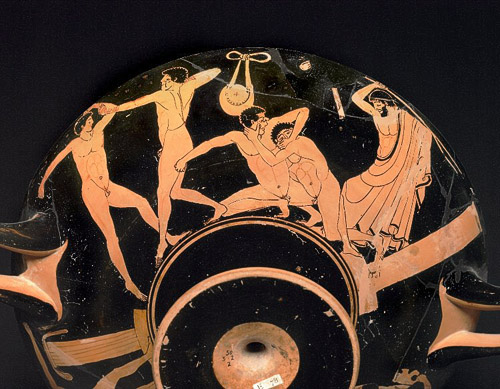Wrestling is officially no longer part of the Olympics after it lost in a runoff vote against seven other sports to retain its spot in the games. First added to the Olympic program in 708 B.C., wrestling found its existence pitted against bids from karate, squash, roller sports, sport climbing, wakeboarding, wushu and a joint bid by baseball and softball. Ultimately, the International Olympic Committee decided to tuck one of the world’s oldest sports into the mothballs of nostalgia.
Basement Notes: Olympic wrestling

Wrestling is officially no longer part of the Olympics after it lost in a runoff vote against seven other sports to retain its spot in the games. First added to the Olympic program in 708 B.C., wrestling found its existence pitted against bids from karate, squash, roller sports, sport climbing, wakeboarding, wushu and a joint bid by baseball and softball. Ultimately, the International Olympic Committee decided to tuck one of the world’s oldest sports into the mothballs of nostalgia.
The IOC revealed its true character last week when its executive board voted by secret ballot to eliminate wrestling as one of the core sports of the Olympic program. The politics are quite simple: Along with field hockey and table tennis, protected because they appeal to the right constituencies (the billion-plus populations of India and China, respectively), four sports were at the greatest risk of being axed in the final cut to get from 26 to 25. Somehow, only wrestling had nobody to represent its interests.
The vice president of the International Modern Pentathlon Union, Juan Antonio Samaranch Jr., is among the 15 board members. World Taekwondo Federation Ethics Commission President Willi Kaltschmitt Lujan is also a member, as is Sir Craig Reedie vwho competed for Great Britain in badminton in the 1960s. In London last summer, taekwondo saw 63 nations compete, badminton and table tennis had 57 each, the modern pentathlon had 26 and field hockey had 15. By contrast, 71 nations were represented in the field of men’s and women’s wrestling, yet it was the other sports that managed to survive the cut.
The program expanded thanks to the addition of golf and rugby sevens to the 2016 games in Brazil. Both are popular sports, especially in countries that have the money the IOC is constantly seeking for television rights. They also offer professional, marketable stars—the idea is that Tiger Woods and Rory McIlroy, draw more casual interest than Rulon Gardner and Jordan Burroughs could ever hope to, and it is difficult to argue with that logic.
Well, difficult except for the fact that adding popular sports only serves to bolster the fortunes of every other sport on the Olympic roster, not hinder them. Look no further than the 2010 Winter Games, when fans tuned in to see Lindsey Vonn, Sidney Crosby and a few other big-name stars compete for medals. Very few even knew who Thomas Ulsrud, Kevin Martin or Eve Muirhead were before the Olympics, yet the initial viewer draw and shrewd marketing campaigns made curling one of the biggest American TV successes of the Vancouver Games. It’s also worth noting that the IOC will award medals in more than 300 events in 28 major sports when the Summer Games head to Brazil in 18 months. An extra core sport in the mix hardly seems like overkill.
This move by the IOC was about where the deepest-pocketed television viewers and the most marketable athletes coexist. It was about how the IOC could negotiate even bigger broadcast deals and expand its $558 million reserve fund. Because there was no representation from FILA, the International Federation of Associated Wrestling Styles, on the IOC Executive Board, there was nobody there to argue for wrestling’s popularity in Russia and India. The board only heard from the former Soviet republics of central Asia, countries where the sport is most popular but where the GDP does little to excite the committee.
It is true that FILA failed to mount even a cursory fight to try and prevent the sport’s exile. But wrestling and the Olympics are linked intrinsically, an important connection to the history of the games and their lasting appeal. As the steward of global sport, the IOC failed in its greater mission by bending to the manipulations of lobbying and lucre, and the Olympics lost a crucial part of its identity along the way.





